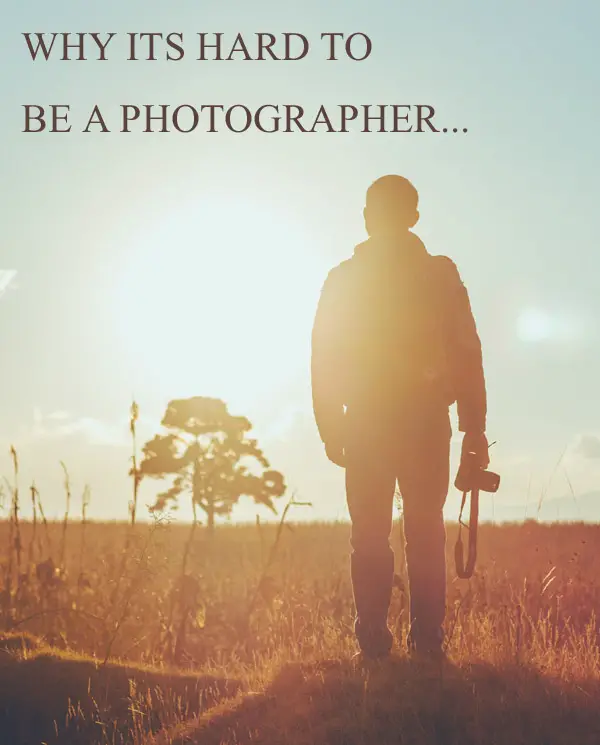Today, with the advent of digital photography, anyone with a decent camera believes they can take good photographs, which isn’t entirely incorrect. Modern technologies like auto focusing, auto exposure (these two have been around for a couple of decades, by the way,) auto panorama stitching, and intelligent eye-tracking, to name but a few, have made the need to hire a professional photographer redundant.

These days almost anyone with a decent camera and a little know-how can easily pull off some great photos. Day by day, the competition to be a photographer is becoming stiff. So, is there still a place for a pro photographer in today’s digital world?
Of course, there is!
While the medium of recording an image has changed over the years from analog to digital (from film to sensors), there are human aspects to being a photographer that no technology or artificial intelligence has been able to replace. Not as yet! Not even with artificial intelligence gradually taking over. They are lighting, and composition – the two essential components of photography without which no photograph can be labeled ‘good.’
There is, of course, also the idea of visualization, a term first coined in 1927 by the famous American landscape photographer Ansel Adams, a term he was to use throughout his long career. Adams’ famous ‘zone system’ is still used by photographers today to evaluate creative exposure areas.
So, What Hasn’t Changed?
Design
Well,for one – the primary camera design. The first version of the Camera, the Camera Obscura, was little more than a light-tight box with a lens and a focusing plane on the opposite side.
Artists used this to trace out the outline of images to get their perspectives accurate. The Camera of today is still essentially a light-tight box! It has a lens on one side and an image-capturing medium, the sensor on the opposite side.
If you ignore the frills of technology, this basic design of the Camera hasn’t changed over the years. It is no harder to be a photographer today than 100 years ago. You still essentially use the same tools as photographers of yesteryear. While it has become easier for a beginner to take photographs, how professional works well on his craft separates a pro from an amateur.
Optics
The second, and probably the more important, aspect of photography that can never really be replaced is how a lens makes an image. Optically, there are times when a longer lens makes a more eye-pleasing image than a shorter focal length lens. At other times, and under different circumstances, a shorter lens makes a better image.
Additionally, a smartphone cannot replicate the resolution, detail, and clarity that a proper camera like a DSLR or mirrorless camera can capture. No matter the number of megapixels squeezed into the miniature mobile phone sensor, the photographs don’t have the dynamic range, detail, and clarity.
Lighting
Okay, you have a good camera, a full-frame, and a great lens. Does that guarantee you will come out with great images? No way! It is more complicated than that to be a photographer!
Anyone with a bit of knowledge of photography knows that the best time to shoot outdoors is during the morning or evening light. Professionals refer to it as the ‘golden hour,’ when the sun is not too high up in the sky.

This light gives a lovely warm tone ideal for portraiture and allows for some nice highlights in the hair when the sun is behind the model. That’s speaking of just natural light.
Photographers don’t have the luxury of choosing a time or place to shoot most of the time; they need to create that effect (or a different effect as the shoot may require) using artificial lights.
Technology helps here, too. With battery-powered outdoor lights, photographers can create highlights just where they want, even the outdoors on an overcast day. It doesn’t sound as simple as using a mobile phone.That’s why people still hire professionals – for their knowledge of equipment- why it is so hard to be a photographer.
You don’t need to have the right equipment; you need to know the technique and how the lighting works for working with minimal gear and yet producing stunning results.
Composition
Whether shooting with a mobile or with a piece of professional camera equipment and the best lights – the gift of composition is something of a human element that nobody can buy (remember the old saying that the best things in life are free?)
While some people are born with the talent to make suitable compositions, it is a skill that can also be acquired over time.
Composition is one of the key elements of a good picture and one that cannot easily be quantified or measured. It also makes it one of those things that make it so hard to be a photographer; because it simply isn’t something that you can go out and buy or even learn in a day.
The rules of composition are more or less psychological aspects that make an image appear pleasing to the human eye. An excellent point to start learning composition is to check up on the golden ratio. It appears naturally in the world that photographers incorporate into their images, among other rules of composition.
To make things even more complicated, photographers sometimes purposely break the rules of compositions to make their images stand apart! But of course, one needs to know the rules before they can go ahead and break them meaningfully.
Visualization
Professional photographers swear by ‘seeing’ an image in their minds before they go ahead and make (not take) the photograph. Once you have the final image in your mind,you need to learn how to break it down into different aspects such as lighting,composition, backgrounds, makeup, styling, etc. (if shooting a model). This process of visualization is something that only comes over time and experience.
This is why a photographer needs to know the fundamentals of composition, design elements, and color theory, to name a few qualities of a professional.
The Human Element
How you treat people can play a huge part in how many returning clients you get as a photographer. It is tough to be a photographer for someone who isn’t a people person, whatever the subject you may be shooting.

Maintaining relationships, basic courtesies, professional behavior on and off shoot, and punctuality all play a significant role in the success of a photographer.
Moreover,when photographing people, a happy photographer is much easier for a model to work with than someone yelling at their assistants!
The Business Factor
So,you’ve learned photography, really given it a shot, you’ve studied the subject and mastered the art. But still, those assignments don’t seem to be coming in. It is a sad truth that most creatively inclined people do not bother about the business aspects of photography.
Given today’s fast-paced world and photographers springing up a dime a dozen, the underrated photographer sometimes makes it hard for a more gifted person to be a photographer – simply because one might be better qualified at the marketing aspects.
There was a time when photographers were few in number and therefore high in demand. Like any other profession, times have changed, and today,a dozen people are aiming at the same job. Consequently, photographers need to ensure that their work is on social media for the target audience even to know that they exist.
Besides, pricing your shoots is also a crucial factor,but that can be an article in itself. How you price yourself should be logically based on the investment in equipment and insurance you’ve made and the unquantifiable aspect of how much you charge for your time as a photographer!
Yes, it is hard to be a photographer, but it always was! There was a time when a photographer needed to also be a chemist, processing images in a dark room to make fine prints.
Many of those procedures and dimensions have changed. Lightroom, Photoshop, Luminar and other software has today replaced the darkroom! Let us say that the essentials of composition, lighting, visualization, optics, and the human element have made it as hard to be a photographer as it was a hundred years ago!
I hope this article gave you some insight into the subject. Click the following link to learn if photography is a dying industry.








